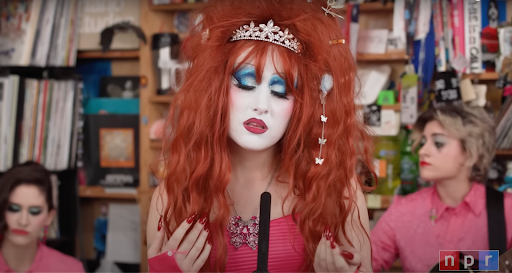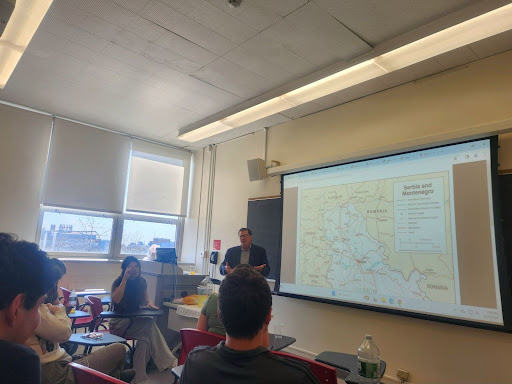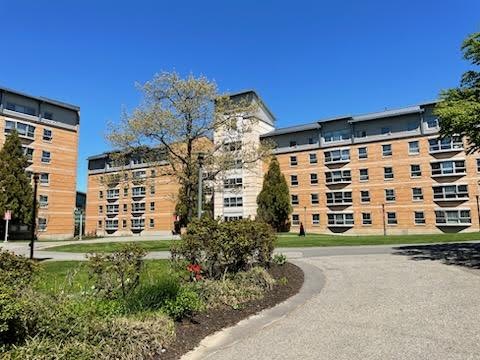The face of mathematics is slowly changing. Although
women continue to lag behind their male counterparts
in terms of achievements both in and out of the
classroom, new research fi nds that this gender gap is
starting to close.
At St. John’s University, however, such a gap does
not exist. Instead, things seem to be quite the opposite: in
recent years, there have actually been more female math
majors than there are males.
According to the Offi ce of Institutional Research, female
math majors outnumber males 21-19 on the Queens
and Staten Island campuses combined for the 2009-10
school year. And while the women have only a slight
edge over the men in the small department, it’s still a
signifi cant fi nding.
“The girl math majors are strong,” said Dr. Charles
Traina, chair of the math department. “Some of them
seem to have much better analytical skills, some of them
have a better work ethic. In some cases some of them are
very, very effi cient and very conscientious.”
Traina noted that many of his female students hold
leadership positions in the Math Club at St. John’s and
Pi Mu Epsilon, a national math honor society, as well
as serving as representatives at the University’s Open
Houses, where prospective students have the chance to
speak with students and professors from many departments.
“They seem more [willing] to come to bat,” he said.
Over the years, Traina, chair of the department since
1996, has had many of his female students move on to
PhD programs in mathematics at rigorous universities
like NYU and Columbia, while others have pursued law
degrees or careers in actuarial science, using their sharp,
analytical skills to their advantage.
One of Traina’s former students is Joan DeBello, who
currently teaches mathematics and computer science in
the College of Professional Students at St. John’s, and is
going for her PhD.
“What made me stay in the program [is that] I always
had good role models,” said DeBello, citing Traina and
another math professor, Dr. Theresa Barz, as positive infl
uences on her in college.
During her time as a student at St. John’s, DeBello
was a member of Women in Science, a program at St.
John’s that encourages women to take classes in math
and science-related subjects.
DeBello said she is hopeful about the state of women
in mathematics, despite the existing stereotypes.
“The stereotype is that math is too hard [for women].
You don’t always see a successful female out there,” she
said, “but companies are starting to hire more females
as CEOs.”
And this “stereotype” DeBello mentioned is one that
even high-profi le professionals have perpetuated.
For instance, back in 2005, Lawrence H. Summers,
then the President of Harvard University, provoked an
outcry when he said that so few women were successful
in the math and science fi elds because of an intrinsic,
biological reason, rather than societal or environmental
infl uences.
Sarah Nelson, a junior, is a shining example of a current
female math major poised to break down any preconceived
notions one might have of a female’s ability to
distinguish herself in such a male-dominated fi eld. Nelson
was one of 12 students accepted into a competitive
summer research program at Carnegie Mellon University
in Pittsburgh. While there, she’ll study mathematical
fi nance and computer programming.
“I’m hoping to get some real research experience and
to discover something on my own,” she said.
Nelson said she really became interested in the subject
back in high school, when she began studying more
theoretical math concepts. Now, she said she enjoys doing
computations, learning techniques and solving problems,
calling the art of mathematics “really beautiful.”
Traina credits Nelson’s quiet disposition as one of
her best qualities as a student.
“Sarah’s very, very good,” he said. “She’s very quiet
about it, that’s the nice thing. She’s a very good student,
she’s a good worker, but she doesn’t boast about it.”
Many experts claim that the disparity between boys
and girls in math starts in elementary school, but new research
from the Center on Education Policy, a national,
independent advocate for public education, seems encouraging.
In an article entitled “Are There Differences
In Achievement Between Boys and Girls?” released in
March 2010, the CEP stated that girls did “roughly as
well as boys” on standardized math tests in elementary
school during the 2007-08 school year.
Not having someone to look up to may also infl uence
a young girl’s attitude towards the subject.
“The lack of a role model and positive infl uence is
what steers people away,” said DeBello.
DeBello also noted that the media’s portrayal of
young boys and girls can also infl uence the way they
tackle math. She said that Teen Umizoomi, a cartoon that
premiered on Nickelodeon in February, features both a
boy and a girl solving math problems, which may have a
positive impact on the way young girls view the subject
in school.
In the New York City area, Allannah Thomas is helping
women achieve their fullest potential in mathematics
in a practical sense. In 1999, Thomas founded Helicon
Inc., a non-profi t organization specializing in math instruction
for low-income women who want to obtain
their GEDs and pursue jobs in the electric, plumbing and
carpentry fi elds, among others, offering test preparation
courses for pre-employment exams.
Thomas works with various organizations like
STRIVE (Support and Training Result in Valuable Employees)
in Harlem, Brooklyn Woods, which prepares
the unemployed for jobs in carpentry, and PSE&G, a
New Jersey-based gas and electric company.
While the majority of her students are women, Thomas
said that about one quarter of her students are men.
She also stated that women fail the GED at a rate of 51
percent, while men fail it at a rate of 34 percent, calling it
a “math issue,” and saying that there is “not one program
in the entire city that just addresses the math issue.”
“Everybody keeps talking about literacy,” she said,
“and it’s not about literacy for everyone.”
To combat this “math issue,” Thomas has started
what she calls a “Day of Remediation” and a “Day of
Memorization,” where her students must be able to show
that they know their basic times tables, something she
said is often glossed over in elementary schools these
days, even though knowing these basic skills is a necessity
in order to move on to more diffi cult concepts. She
said that while she isn’t doing anything “spectacular,”
her methods work, prompting more and more companies
to want to use her services to fi nd skilled employees.
Thomas explained that oftentimes, it is harder for
women to get jobs because they may decide to start families
and simply do not have the time to work full-time.
She also noted that at companies like PSE&G, wages
for technical trades jobs that are held predominantly by
men, are much higher than wages for clerical jobs, which
are held predominantly by women because the pre-employment
exams for the technical trades jobs features
many more diffi cult math problems.
While Thomas is dedicated to imparting math skills
to her female students so that they can obtain employment
opportunities, she also said that part of her job is
being a cheerleader, encouraging her students to succeed.
“Everybody needs to learn that women can do this
stuff,” she said. “First and foremost, women need to understand
that.”















